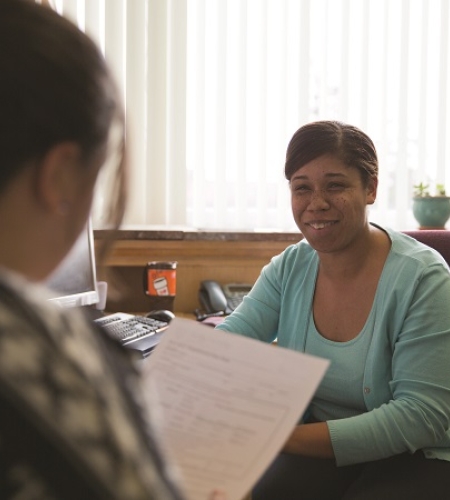
Counseling Psychology, School Counseling, M.S.
The School Counseling concentration in the M.S. in Counseling Psychology program at Holy Family University is approved by the Pennsylvania Department of Education, allowing students to receive their professional certification as Pre K-12 school counselor.
Program Overview
As in all of the concentrations, the school counseling concentration provides a basic foundation in counseling theory and skills with additional coursework that focuses on preparing master-level counselors to work in a school setting.
Program Details
School counselors are introduced to the American School Counseling Association’s (ASCA) National Model, based in the following areas: define, deliver, manage, assess. As such, they are uniquely qualified to address all student needs— academic, career, and personal/social development. Additionally, they are trained to develop comprehensive programs that promote and enhance student success.
School counselors come to recognize that through leadership, advocacy, and collaboration, they have the opportunity to promote equity and access to rigorous educational experiences for all students in elementary, middle/junior, and high schools.
Advocacy is a strong component of our school counseling concentration. It is built into the curriculum and reinforced with opportunities to advocate outside of the classroom, such as trips to Harrisburg and Washington, DC to lobby for school counseling issues.
Likewise, students have presented their research and advocacy efforts in a number of venues including the ASCA annual conference, the PA School Counseling Association’s annual conference, and the PA Counseling Association’s regional conference.
In order to meet the PA Department of Education’s (PDE) regulations, the program includes two additional courses pertaining to working with English Language Learners (COUN 576) as well as working with students with emotional and learning disabilities (COUN 575).
An additional strength is the dual curriculum, which enables students to be eligible for meeting the requirements to obtain their license as a professional counselor (LPC) as well as their certification as a school counselor. This is unique since they leave the program with marketable skills for employment as a counselor in schools but also in many other areas of mental health. 98% of our students choose to get their license as a Professional Counselor.
Career Paths
What Can I Do with this Degree?
According to the Occupational Outlook Handbook (2018-19) employment of school counselors is projected to grow 8% by 2028, faster than the average for all occupations.
This is the only Counseling Psychology concentration that enables a student to function as a certified school counselor in a school setting. Students in this concentration are eligible to pursue licensure as a Licensed Professional Counselor (LPC). This provides an opportunity for graduates to obtain employment in various agencies as well as in schools. It offers the graduate the prospect of considering working in a private practice and collecting third-party insurance payments.
Internships & Employment
Where Students and Alumni Intern and Work
Holy Family University’s Counseling Psychology graduate employment rate in the field has averaged 91% over the past 4 years.
Holy Family University Counseling Psychology students have an 86% first time pass rate on the licensure exam (NCE) and a 98% first time pass rate on the school counselor exam (Praxis).
Many of our graduates have been employed as counselors in school districts and private schools in Bucks, Montgomery, and Philadelphia counties as well as in New Jersey.
Questions? Contact the Graduate and Adult Admissions Office
The Graduate and Adult Admissions Office
Related Programs
Counseling Psychology, M.S. G
The Master of Science in Counseling Psychology program prepares students to become professional community mental health counselors in a variety of settings including human service agencies, schools, and hospitals.
Psychology, B.A. UG
The Psychology major examines the scientific study of the brain and behavior. Students have the opportunity to take coursework in many subfields of psychology including biological, clinical, cognitive, developmental, and social psychology.
